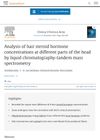TLDR A new method accurately measures steroid hormones in a few hair strands and could help study chronic stress and hair loss.
In a study by Hobo et al., a new LC-MS/MS method was developed to measure ten steroid hormones in 5 to 10 hair strands, demonstrating high accuracy (96.0-106.4% intra-assay and 96.9-104.9% inter-assay) and precision (4.8-10.6%). The method used a novel extraction solvent, improving cortisol extraction by about two-fold. It showed good linearity, acceptable matrix effects, and high recovery rates (94.1-108.3%) for the hormones. Applied to 6 healthy male volunteers, the method successfully measured 8 out of 10 steroids, suggesting its potential for evaluating chronic stress and alopecia-related conditions with minimal sample requirements. The method's sensitivity and low invasiveness make it suitable for large-scale studies and could clarify the relationship between steroid hormone levels and hair loss diseases.
157 citations
,
June 2015 in “Psychoneuroendocrinology” Hair cortisol and cortisone levels increase with age, are higher in diabetics, vary by gender, decrease with frequent hair washing, and are lower in winter.
30 citations
,
April 2011 in “Rapid communications in mass spectrometry/RCM. Rapid communications in mass spectrometry” Analyzing hair with this method can help understand and monitor scalp conditions and treatment effects.
 501 citations
,
October 2008 in “Psychoneuroendocrinology”
501 citations
,
October 2008 in “Psychoneuroendocrinology” Hair cortisol levels can show increased stress during late pregnancy but only for up to six months.
 December 2025 in “Biology Bulletin Reviews”
December 2025 in “Biology Bulletin Reviews” Hair cortisol can indicate animal stress but varies with many factors.
296 citations
,
October 2018 in “General and Comparative Endocrinology” Hair cortisol is a reliable way to measure long-term stress in animals.
 3 citations
,
October 2021 in “Clinica Chimica Acta”
3 citations
,
October 2021 in “Clinica Chimica Acta” Hormone levels in hair vary across the head, with the highest concentration of a key hormone linked to hair loss at the top.
7 citations
,
November 2022 in “Toxics” The method accurately measures 19 steroid hormones in human blood and urine using a small sample and is suitable for large-scale monitoring.
 117 citations
,
May 2017 in “Human Reproduction Update”
117 citations
,
May 2017 in “Human Reproduction Update” The update highlights that non-classic congenital adrenal hyperplasia is common in women with excess male hormones, requires specific hormone tests for diagnosis, and has various treatment options depending on age and symptoms.




